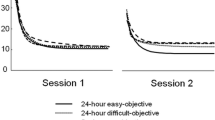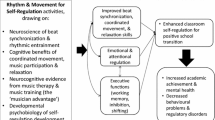Abstract
The ancillary (non-sounding) body movements made by expert musicians during performance have been shown to indicate expressive, emotional, and structural features of the music to observers, even if the sound of the performance is absent. If such ancillary body movements are a component of skilled musical performance, then it should follow that acquiring the temporal control of such movements is a feature of musical skill acquisition. This proposition is tested using measures derived from a theory of temporal guidance of movement, “General Tau Theory” (Lee in Ecol Psychol 10:221–250, 1998; Lee et al. in Exp Brain Res 139:151–159, 2001), to compare movements made during performances of intermediate-level clarinetists before and after learning a new piece of music. Results indicate that the temporal control of ancillary body movements made by participants was stronger in performances after the music had been learned and was closer to the measures of temporal control found for an expert musician’s movements. These findings provide evidence that the temporal control of musicians’ ancillary body movements develops with musical learning. These results have implications for other skillful behaviors and nonverbal communication.





Similar content being viewed by others
Notes
Details of ABRSM grade definitions can be found at the following online address: http://www.abrsm.org/regions/fileadmin/user_upload/syllabuses/clarinet0510.pdf.
References
Associated Board of the Royal Schools of Music (2007) Selected clarinet exam pieces 2008–2013 Grade 3. ABRSM Publishing, London
Austad H, Van der Meer ALH (2007) Prospective dynamic balance control in healthy children and adults. Exp Brain Res 181:289–295. doi:10.1007/s00221-007-0932-1
Bates BT, James CR, Dufek JS (2004) Single-subject analysis. In: Sterigou N (ed) Innovative analysis of human movement. Human Kinetics, Leeds, pp 3–28
Bernstein NA (1967) The co-ordination and regulation of movements. Pergamon Press, Oxford
Bootsma RJ, Craig CM (2003) Information used in detecting upcoming collision. Perception 32:525–544. doi:10.1068/p3433
Brault S, Bideau B, Kulpa R, Craig CM (2012) Detecting deception in movement: the case of the side-step in rugby. PLoS ONE 7:e37494. doi:10.1371/jounral.pone.0037494
Clarke EF (1999) Rhythm and timing in music. In: Deutsch D (ed) The psychology of music, 2nd edn. Academic Press, New York, pp 473–500
Craig CM, Lee DN (1999) Neonatal control of sucking pressures. Evidence for an intrinsic (tau)-guide. Exp Brain Res 124:371–382. doi:10.1007/s002210050634
Craig CM, Delay D, Grealy MA, Lee DN (2000a) Guiding the swing in golf putting. Nature 405:295–296. doi:10.1038/35012690
Craig CM, Grealy MA, Lee DN (2000b) Detecting motor abnormalities in preterm infants. Exp Brain Res 131:359–365. doi:10.1007/s002219900227
Craig CM, Pepping G, Grealy M (2005) Intercepting beats in predesignated target zones. Exp Brain Res 165:490–504. doi:10.1007/s00221-005-2322-x
Daffertshofer A, Lamoth CJC, Meijer OG, Beek PJ (2004) PCA in studying coordination and variability: a tutorial. Clin Biomech 19:415–428. doi:10.1016/j.clinbiomech.2004.01.005
Dahl S, Friberg A (2007) Visual perception of expressiveness in musicians’ body movements. Music Percept 24:433–454. doi:10.1525/mp.2007.24.5.433
Davidson J (1993) Visual perception of performance manner in the movements of solo musicians. Psychol Music 21:103–114. doi:10.1177/030573569302100201
Delafield-Butt J, Galler A, Schogler B, Lee DN (2010) A perception—action strategy for hummingbirds. Perception 39:1172–1174. doi:10.1068/p6708
Drake C, Palmer C (2000) Skill acquisition in music performance: relations between planning and temporal control. Cognition 74:1–32. doi:10.1016/S0010-0277(99)00061-X
Gibson JJ (1979) The ecological approach to visual perception. Lawrence Erlbaum Associates, Hillsdale
Goldin-Meadow S (2003) Hearing gesture: how our hands help us think. Harvard University Press, Harvard
Hogan N, Sternad D (2009) Sensitivity of smoothness measures to movement duration, amplitude, and arrests. J Motor Behav 41:529–534. doi:10.3200/35-09-004-RC
Jolliffe IT (2002) Principal component analysis, 2nd edn. Springer, New York
Kayed NS, Van Der Meer ALH (2009) A longitudinal study of prospective control in catching by full-term and preterm infants. Exp Brain Res 194:245–258. doi:10.1007/s00221-008-1692-2
Lee DN (1976) A theory of visual control of braking based on information about time to collision’. Perception 5:437–459
Lee DN (1998) Guiding movement by coupling taus. Ecol Psychol 10:221–250. doi:10.1207/s15326969eco103&4_4
Lee DN (2004) Tau in action in development. In: Reisser JJ, Lockman JJ, Nelson CA (eds) Action as an organizer of learning. Lawrence Erlbaum Associates, Hillsdale, pp 3–49
Lee DN, Reddish PE (1981) Plummeting gannets: a paradigm of ecological optics. Nature 293:293–294. doi:10.1038/293293a0
Lee DN, Lishman JR, Thomson JA (1982) Regulation of gait in long jumping. J Exp Psychol Hum Percept Perform 8:448–459. doi:10.1037/0096-1523.8.3.448
Lee DN, Simmons JA, Saillant PA, Bouffard F (1995) Steering by echolocation: a paradigm of ecological acoustics. J Comp Physiol 176:347–354. doi:10.1007/bf00219060
Lee DN, Georgopoulos AP, Clark MJO, Craig CM, Port NL (2001) Guiding contact by coupling the taus of gaps. Exp Brain Res 139:151–159. doi:10.1007/s002210100725
McNeill D (2005) Gesture and thought. University of Chicago Press, Chicago
Palmer C (1989) Mapping musical thought to musical performance. J Exp Psychol Hum Percept Perform 15:311–346. doi:10.1037/0096-1523.15.2.331
Rodger MWM, Craig CM, O’Modhrain S (2012) Expertise is perceived from both sound and body movement in musical performance. Hum Mov Sci 31:1137–1150. doi:10.1016/j.humov.2012.02.012
Schmidt A (2012) Movement pattern recognition in basketball free-throw shooting. Hum Mov Sci 31:360–382. doi:10.1016/j.humov.2011.01.003
Schogler B, Pepping G-J, Lee DN (2008) TauG-guidance of transients in expressive musical performance. Exp Brain Res 189:361–372. doi:10.1007/s00221-008-1431-8
Sloboda J (1996) The acquisition of musical performance expertise: deconstructing the “talent” account of individual differences in musical expressivity. In: Ericsson KA (ed) The road to excellence: the acquisition of expert performance in the arts and sciences, sports, and games. Lawrence Erlbaum Associates, Hillsdale, pp 107–126
Todd NPM (1992) The dynamics of dynamics: a model of musical expression. J Acoust Soc Am 91:3540–3550. doi:10.1121/1.402843
Todd NPM (1995) The kinematics of musical expression. J Acoust Soc Am 97:1940–1949
Vines BW, Krumhansl CL, Wanderley MM, Levitin DJ (2006) Cross-modal interactions in the perception of musical performance. Cognition 101:80–113. doi:10.1016/j.cognition.2005.09.003
Vines BW, Krumhansl CL, Wanderley MM, Dalca IM, Levitin DJ (2011) Music to my eyes: cross-modal interactions in the perception of emotions in musical performance. Cognition 118:157–170. doi:10.1016/j.cognition.2010.11.010
Wanderley MM, Vines BW (2006) Origins and functions of Clarinettists’ ancillary gestures. In: King E, Gritten A (eds) Music and gesture: new perspectives on theory and contemporary practice. Ashgate, Hampshire, pp 165–191
Wanderley MM, Vines BW, Middleton N, McKay C, Hatch W (2005) The musical significance of clarinetists’ ancillary gestures. J New Music Res 34:97–113. doi:10.1080/09298210500124208
Acknowledgments
This research was supported by the SKILLS integrated project funded by the European Commission (FP6-IST, Proposal/Contract no.: 035005) and by the TEMPUS-G project funded by the European Research Council (210007 StIG). Thanks go to Rob Plane for giving of his time to record the expert performances used in this study.
Author information
Authors and Affiliations
Corresponding author
Rights and permissions
About this article
Cite this article
Rodger, M.W.M., O’Modhrain, S. & Craig, C.M. Temporal guidance of musicians’ performance movement is an acquired skill. Exp Brain Res 226, 221–230 (2013). https://doi.org/10.1007/s00221-013-3427-2
Received:
Accepted:
Published:
Issue Date:
DOI: https://doi.org/10.1007/s00221-013-3427-2




